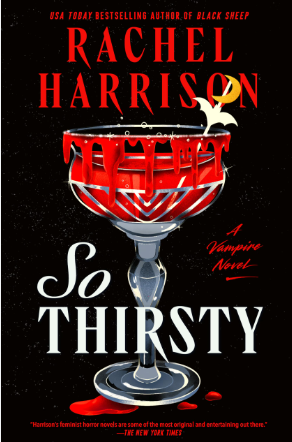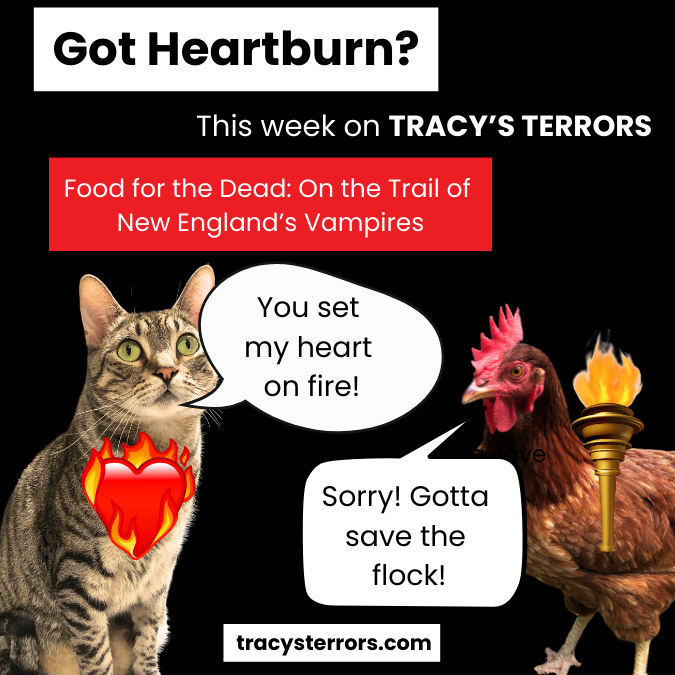

From The Harpy to Night Bitch and beyond, novels with monstrous women are popular in contemporary literature. Every time I open a book, there’s a female protagonist who expresses her authentic self by turning into some sort of creature. Have I hit the saturation point yet? I hadn’t thought so until I picked up Rachel Harrison’s So Thirsty (2024). Harrison has successfully covered this ground before with werewolves in Such Sharp Teeth (2022), but her recent turn to vampires foregrounds the potential shortcomings of the trope. In So Thirsty, the monstrous transformation conceit is the perfect scaffolding for schematic characters who operate on a cautious/crazy, tame/wild axis. The protagonist’s predictable move from the left side of this binary to the right supports a message straight out of a dark chocolate ad–”Go ahead and indulge.” Lest I be accused of approaching a work that’s supposed to be lighthearted fun with a critical sledgehammer, let me just say that I’m not looking for Jamesian explorations of interiority or ambiguous but profound endings. Rather, I’m looking for the fulfillment of her brand’s promise. I expect to finish a Harrison novel feeling like women have options and can be whomever they want. But, here, the vision of female freedom feels unidirectional and unappealing. I’ve heard this book described as Thelma & Louis with vampires, and in a way, that’s an apt comparison. After all, their only choice was to drive off a cliff.
After a turbulent period of excess in her early 20s, the protagonist Sloane stifles her desires and deprives herself of pleasure for the sake of stability, a quality that she seems to value above all else. She’s left the city for the suburbs, settled for Joel–a man with infidelity issues–and resigned herself to an uninspiring job, all so that she can have a house, pay the bills, and maintain a comfortable middle-class existence. Sloane’s routine is disrupted when, for her 36th birthday, Joel surprises her (and oh how she hates surprises!) with a trip to a bougie resort in the Finger Lake region where she’ll be met by her best friend Naomi. It’s a girls-only vacation, a premise that’s becoming a Harrison touchstone; and here, as in previous texts, the scenario allows her to explore her favorite character dynamic: The female friendship in which women embody oppositional traits. Naomi and Sloane couldn’t be more different. A PR agent for her rockstar boyfriend, Naomi travels the world, parties hard, and pursues adventure. It’s not surprising, then, that during the first night of their gal getaway, she accepts an invitation to a party from a stranger, later springing it on Sloane as a birthday gift, an opportunity to escape her comfort zone. Begrudgingly accompanying Naomi, Sloane discovers that the party is actually an orgy and their hosts are vampires. The friends are turned into bloodsuckers, and Sloane has to decide whether or not the transformation is a gift or a curse. Will she deny her thirst and condemn herself to an eternity of unsatisfied longing, or will she indulge her appetites and–in death–truly live?
While other novels might linger on the vampire conversion, building tension around whether or not the friends will be bitten and changed, Harrison takes care of this pivotal moment upfront so that we can focus instead on Sloane’s decision to embrace or ignore her repressed wild side. This is the plot’s central conflict, but unfortunately it’s too simplistic to sustain a novel-length fiction. Far too many pages are given to outlining each side of the divide: If Sloane is uptight, cautious, and drab, Naomi is uninhibited, daring, and vibrant. Constraint versus freedom, reserve versus release, the antithetical pairings are endless and unnecessary because the dynamic is basic and laid out early on. Moreover, there’s no real exciting anticipation because Sloane’s eventual movement from one end of the spectrum to the other is inevitable. Of course, she’ll embrace liberation and authentic self expression. It’s a Rachel Harrison novel.
I sound almost embarrassingly peevish here, and I think it’s because I’m a little tired of the message that Harrison’s book delivers. It’s one that bombards women everyday. Eat the seductive chocolate! Take that wild vacation! Treat yourself to the sparkly nail polish! Let your hair down because you deserve it! Capitalism loves the narrative of cutting loose and breaking boundaries because self-reinvention means buying new markers of identity.
But aside from being a thinly veiled vehicle for the logic of consumerism and a gift to ad execs everywhere, this message has also gotten to be my psyche’s weapon of choice whenever I’m tempted to blow up my life. With the exception of the cheating husband–because no one deserves that–Sloane’s life sounds pretty good to me. She works remotely and has time to enjoy hobbies like gardening, baking, and reading. She hikes when it’s warm and goes to the movies when it’s cold. She listens to true crime podcasts while soaking in Epsom-salt baths. In other words, she takes pleasure in the mundane and finds beauty in the small things. Isn’t that what it’s all about? I don’t want to get too autobiographical here, but I’ll admit that my existence bears a close resemblance to Sloane’s and, most of the time, it’s great. What brings me down is this internalized and, I suspect, very American idea that contentment isn’t enough; we must always be chasing and grasping at dreams supplied by Hollywood. I begin to entertain fantasies of starting a new career, pulling up stakes and moving to a different country, etc., before remembering that such bold moves rarely lead to more happiness. Our culture’s idealization of pointless risk-taking is just a tool for undermining the joy that might be felt in the present moment. This is a lot to put on a light read, I know, but So Thirsty participates heavily in a narrative of transformation that I increasingly find exhausting.
At first I thought that the book was a send-up of this narrative. The vampire lifestyle is a clear counterpoint to Sloane’s, and it seems pretty awful, all grimy hotel rooms and unenthusiastic orgies with people who smell bad. Who wants to sleep on the floor of an outdoor renaissance set in the middle of winter or have sex on a snow covered theme-park prop? But what I initially took for an ironic critique of an increasingly overbearing concept was, as I realized by the end of the book, really just a straight up celebration of it. If this is what authentic living looks like, then I’d rather be a “normie” working in my garden.
While Sloane’s personal development feels very paint-by-numbers, Alice, an elderly vampire with a bit part in the story, skips simple coloring outside of the lines to scrawl revolutionary slogans on the wall. She’s fascinating. Hunting alone on a desolate stretch of park land, Alice has been ostracized by the young hipster vampires with whom Sloane hangs because, they say, she’s broken the vampire code of ethics: They can kill people and drink their blood but it’s wrong to eat their bodies. Alice points out the arbitrary nature of this rule and, cutting straight to the heart of their pretensions, attributes her isolation to age discrimination. She persuaded me! Sloane, on the other hand, accepts her gang’s moral system, a capricious collection of dictates that, in this case, allows them to exclude the only female character who can’t pull off silk pajamas or leather pants. Very convenient.
The Alice episode sits uncomfortably in a book that is, at bottom, about the challenges women face as they age. Through Sloane, Harrison explores what it’s like to feel the cloak of invisibility descend upon you, and she captures the dull pain of becoming invisible. Given that her books are all about female empowerment, I expected a fictional form of redress that would–I don’t know–reinscribe wrinkles and jowls as clever camouflage coveted by other, younger, vampires. But instead the book boldly reinforces the cultural values that drive Sloane’s imminent erasure: The only way to save her is to immediately arrest the aging process. At 36, she is already an outlier in the group, and the vampires, who prize sex, youth, and beauty above all else, consider it cruel to turn someone “late.” Not because the resulting monster would be frail–Alice is strong and fast–but, presumably, because they’d look like someone’s grandmother. Clearly, it’s better to be dead than to look old.
But don’t listen to me–these are just the natterings of a middle-aged woman. If you like Rachel Harrison’s novels, then you’ll like this one as well–believe it or not, I do. Her winning formula is still there, it just feels like it’s been stripped down to its most basic parts. This simplification has nothing to do with vampires per se–to my mind, they’re the most interesting and complicated of creatures–but instead with a narrow idea of what these monsters can be. I don’t see why vampires have to live as extroverted, nomadic, rockstars. In my fantasy world, they can have their blood and their podcasts, too.